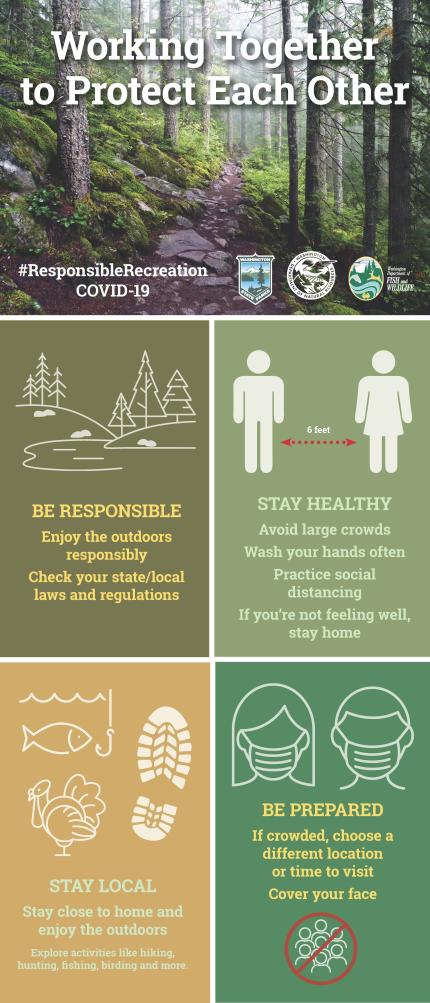ARCHIVED NEWS RELEASE
This document is provided for archival purposes only. Archived documents
do not reflect current WDFW regulations or policy and may contain factual
inaccuracies.
News release April 27, 2020
WDFW: Rachel Blomker, Communications Manager, 360-701-3101
State Parks: Anna Gill, Communications Director, 360-902-8562
OLYMPIA -- The Washington Department of Fish and Wildlife (WDFW) and Washington State Parks and Recreation Commission (Parks) announced today they will reopen state-managed lands on Tuesday, May 5, for local day-use only recreation.
The reopening will apply to state-managed parks, wildlife areas, recreation land, and boat launches. However, it may take several days for gates to be unlocked and sites to be serviced at remote areas due to limited staff capacity.
Some parks may not open immediately due to impacts on rural communities and the potential for crowding. State Parks is working with local communities and its partners to determine the best approach and timing to reopening these areas.
Visitor centers, camping, and other overnight accommodations on state-managed lands will remain closed until further notice.
The Department of Natural Resources (DNR) also plans to reopen their recreation lands on May 5 for day-use. For more information on DNR's operations, visit dnr.wa.gov/open.
State land managers recommend people come prepared and bring their own hand washing supplies, toilet paper, and personal protective equipment as some sites will have reduced or limited restroom facilities. People should also be prepared to change plans if their destination appears crowded or is not yet fully operational.
If sites become overcrowded or other COVID-19 related public safety concerns develop, state agencies may close areas with limited notice to further protect public health and safety. Certain restrictions around specific activities may also apply.
The public can find the latest information about WDFW and Parks operations at:
Guidelines for #ResponsibleRecreation

Before you go
- Check what’s open. While many state-managed land destinations are open for day-use, other local, tribal, and federal land may still be closed.
- Opt for day trips close to home. Overnight stays are not permitted.
- Stay with immediate household members only. Recreation with those outside of your household creates new avenues for virus transmission.
- Come prepared. Visitors may find reduced or limited restroom services as staff begin the process to reopen facilities at wildlife areas and water access sites. You are advised to bring your own soap, water, hand sanitizer, and toilet paper, as well as a mask or bandana to cover your nose and mouth.
- Enjoy the outdoors when healthy. If you have symptoms of fever, coughing, or shortness of breath, save your outdoor adventure for another day.
When you get there
- Avoid crowds. Be prepared to go somewhere else or come back another time if your destination looks crowded.
- Practice physical distancing. Keep six feet between you and those outside your immediate household. Launch one boat at a time to give others enough space to launch safely. Leave at least one parking space between your vehicle and the vehicle next to you. Trailer your boat in the same way.
- Wash your hands often. Keep up on personal hygiene and bring your own water, soap, and hand sanitizer with you.
- Pack out what you pack in. Take any garbage with you, including disposable gloves and masks.
About WDFW Lands
The Washington Department of Fish and Wildlife actively manages about a million acres of land, with 33 wildlife areas and nearly 500 water access sites around the state. These public lands help sustain wildlife habitat and public recreation opportunities for current and future generations. WDFW is the primary state agency tasked with preserving, protecting, and perpetuating fish, wildlife, and ecosystems, while providing sustainable fishing and hunting opportunities.
About Washington State Parks
The Washington State Parks and Recreation Commission manages more than 120 state parks and properties totaling approximately 138,000 acres. The Commission provides a variety of recreation opportunities for citizens and provides stewardship protection for a diverse array of natural, cultural and historic resources. State Parks’ statewide programs include long-distance trails, boating safety and winter recreation.